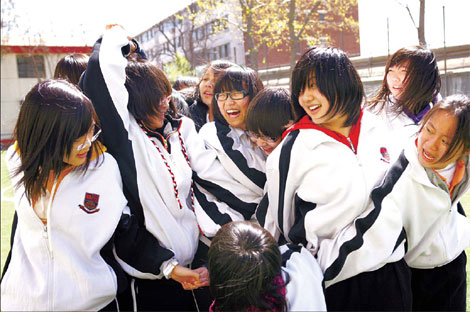
A group of classmates from Camford Royal School work on their teamwork skills, which are promoted at private institutions. [Zou Hong / China Daily]
Top achievers from public schools take alternative routes for elite foreign universities
One year ago, Zhang Yutong, 16, gave up the chance to study at a top Beijing high school for a place in a relatively unknown private alternative.
Zhang's decision to cancel an application to the prestigious No 4 Middle School in Beijing and go private was seen by many as risky, but the sensible student was fixed on making his academic dream come true.
"I want to study economics at Wharton School of the University of Pennsylvania, not Peking University or Tsinghua University," Zhang said.
"I now study a domestic curriculum as well as courses normally taught at high schools in UK and US. This will give me the advantage when applying for a university place abroad."
Zhang is just one of 200 students in Camford Royal School's international department. All come from elite public primary and middles schools, possess excellent academic skills, and have set their sights on top overseas universities.
And the good news is that their ambitious move seems to be going as planned.
More than 90 percent of all students in the school's international department enroll in the world's top 40 universities every year, said Liu Yuyan, president of Camford Royal School and a PhD in physics, adding that the majority were admitted by US universities.
Liu, who is also the school's physics teacher, said their two approaches of "backward designing" and "subject arrangements" help the students become more competitive.
In "backward designing", for example, a teacher will give students a goal and then ask them to research everything they need on their own, instead of teaching directly.
"Students will learn how to discover and process information," he said. "It sounds basic, but it is very important in this information explosion era."
Liu said he could complete a textbook designed to last one semester at a public school in only a couple of weeks. He would then let the students digest the information alone or in groups.
Group discussions also encourage students to learn how to raise and solve problems through teamwork, he said.
"It is important for Chinese students to know the benefits of turning to each other when encountering difficulties, rather than always trying to solve them alone," he said.
A main feature of the school is that it offers a combination of Chinese and Western countries education approaches.
The international department provides a three-year bilingual course: the first year is made up primarily of subjects taught by Chinese high schools with a few exceptions such as American history, which is taught in English.
In the second and third year, students will study AP and A-level classes - the standard entry qualification for US and UK universities.
Liu became the first to introduce AP and A-level courses in Beijing in 2003, after receiving his doctorate degree in chemistry from Cambridge University.
He made his introduction based on a belief that a lot of knowledge taught in public schools is outdated.
For example, he said the computer program Access is no longer used in computer science, but many schools in China continue to teach it because professors are out of date.
"My school has set a very high standard for teachers. They have to research and update their subjects," he said.
The school's key intention, Liu said, is to encourage students to discover interests and develop them into future academic fields.
Student Zhang Jingqi, 18, transferred from Zhongguancun Middle School to Camford Royal School one year ago due to his low academic performance - a result of his dedication to music.
He said his former teachers almost gave him up.
"But teachers at this private school always encourage me to follow my dream and give me enough free time to practice in my band," Zhang said.
"I want to get into a musical engineering major at a university in UK."


